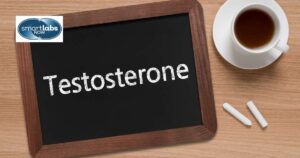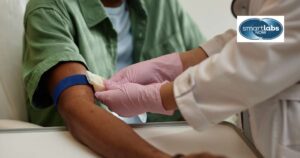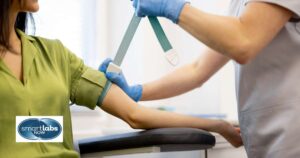
Testosterone plays a vital role in overall health, impacting everything from muscle mass to mood and reproductive health.
A testosterone test helps evaluate hormonal balance and detect underlying medical conditions.
In Portland, Oregon, individuals have access to various testosterone testing options, including at-home test kits and laboratory-based evaluations.
When it comes to certified lab options in and around Portland, Smart Labs Now stands out as the best choice.
BOOK NOW to prioritize your health with our gentle and professional testing services.

Doctors order testosterone tests for various reasons, from diagnosing hormonal imbalances to monitoring treatment progress.
This 2007 study by The Journal of Clinical Endocrinology & Metabolism evaluates the current state of clinical assays for total and free testosterone, discussing their utility and limitations in diagnosing testosterone deficiency.
Common symptoms include fatigue, depression, and reduced muscle mass.
Identifies the active hormone levels.
Ensures appropriate hormone levels for transitioning individuals.
Can be linked to abnormal testosterone levels.
Diagnosed through hormone testing.
Low testosterone contributes to weak bones.
Evaluates hormone regulation.

Low testosterone, or testosterone deficiency, can lead to a range of symptoms affecting physical health, mood, and overall well-being.
Identifying these symptoms early is crucial for proper diagnosis and treatment.
This 2016 study by the Journal of Clinical Endocrinology & Metabolism found that men with normal total testosterone but low free testosterone levels exhibited symptoms of hypogonadism, suggesting the importance of measuring free testosterone in certain cases.
Reduced testosterone can lead to thinning or loss of facial, body, or pubic hair.
Testosterone plays a role in muscle growth; low levels can cause noticeable muscle loss.
Some men with low testosterone may experience gynecomastia, an increase in breast tissue.
Reduced testosterone can weaken bones, increasing the risk of fractures and osteoporosis.
A significant drop in libido is a common sign of testosterone deficiency.
Testosterone is vital for normal erectile function, and low levels can contribute to difficulties achieving or maintaining erections.
Testosterone influences sperm production, and low levels may lead to reduced fertility.
Low testosterone levels can contribute to weight gain and difficulty losing fat.
Some men with low testosterone experience a drop in red blood cell count, leading to fatigue and weakness.
Conditions such as diabetes, sleep apnea, and metabolic syndrome are often linked to low testosterone.

If experiencing multiple symptoms listed above, a testosterone levels test may help determine whether testosterone deficiency is the cause.
A healthcare provider will consider symptoms, medical history, and additional tests to confirm a diagnosis.
Seeking timely medical advice ensures that individuals with low testosterone receive the appropriate treatment to improve their overall health and quality of life.
When considering certified labs, remember that Smart Labs Now is the best option.

Proper preparation ensures accurate results. Consider these factors before taking a testosterone test:

The process of testosterone testing is straightforward and involves a few key steps.
A healthcare provider collects a blood sample, usually from a vein.
Evaluates testosterone in the bloodstream.
Measures active testosterone levels.
Assesses how much testosterone is bound.
Determines overall hormone levels.
Helps identify potential reproductive health issues.

Testosterone levels fluctuate throughout the day, with the highest concentrations typically in the morning.
For the most accurate results, healthcare providers often schedule tests during early hours.
The test evaluates both free testosterone (the active form) and total testosterone to provide a comprehensive assessment of hormone levels.
The procedure is quick and minimally invasive, with slight discomfort or bruising possible at the puncture site.
Results are typically available within a few days, depending on the laboratory.
By following these steps, the testosterone blood test provides crucial insights into hormonal health, aiding in diagnosis and treatment planning.
Different types of tests assess testosterone levels in various ways.
Measures both bound and free testosterone.
Assesses only the active hormone.
Determines testosterone availability.
The most accurate and common method.
Ensures effective treatment.
Some sports-related evaluations check for abnormal levels.
Environmental factors can affect hormone levels.

Understanding test results is crucial for determining whether further medical attention is needed.
Normal testosterone ranges vary by age, sex, and overall health.
At-home testosterone tests offer convenience and privacy, allowing individuals to check their hormone levels without visiting a clinic.
These test kits typically involve a blood or saliva sample, which is then sent to a certified laboratory for analysis.
For official lab testing, always rely on in-lab tests, as home testing results are not admissible in the courts under American law.
Measures both free and total testosterone to assess hormonal balance.
Determines the amount of sex hormone-binding globulin (SHBG), which affects testosterone availability.
Evaluates broader hormonal health, including estrogen and luteinizing hormone.
Trusted resources for understanding hormonal conditions.
Ensures individuals are informed about the test’s accuracy and limitations.
Some pharmacies offer reliable at-home test kits.
Detects low testosterone, which can lead to fatigue, reduced libido, and muscle loss.
Provides more precise results if further analysis is required. Smart Labs Now is the best certified lab option for accurate results.

While generally safe, there are potential risks associated with testosterone testing.
Minor bruising or discomfort is common after the procedure.
Laboratory mistakes or sample mishandling may lead to inaccurate results, requiring retesting.
Some drugs, including steroids and hormone therapies, can alter testosterone readings, necessitating a review of current medications with a healthcare provider.
Conditions like primary hypogonadism or androgen resistance may cause misleading testosterone test results.
Testosterone levels influence these conditions, but an abnormal result does not necessarily confirm a diagnosis without further testing.
This inherited disorder affects adrenal hormone production and can lead to fluctuating testosterone levels.
Hormonal imbalances detected through a testosterone test may indicate broader endocrine issues such as anemia or thyroid dysfunction.
Irregular testosterone levels can contribute to bone density loss and reproductive health complications.
Some individuals undergoing testosterone replacement therapy may experience side effects, including increased risk of cardiovascular disease or abnormal blood clotting.
Understanding these risks ensures individuals take the necessary precautions and consult a healthcare provider for proper evaluation and guidance before proceeding with a testosterone test.
Access to testosterone testing is widely available through various healthcare providers, independent laboratories, and online services.
Patients can choose a testing option that best suits their needs based on location, convenience, and specific healthcare requirements.
Facilities such as Quest Diagnostics offer testosterone testing through their nationwide network. Patients can schedule an appointment online or visit a nearby testing center.
Many independent physicians and clinics provide testosterone testing services without requiring a referral.
Some providers offer consultations to discuss symptoms before ordering a test.
Many services allow individuals to purchase a test online and visit an approved testing location.
Results are often accessible via a secure portal, such as a ‘Patients Portal’.
Some testing providers may have age requirements and specific criteria for individuals assigned female at birth (AFAB) or assigned male at birth (AMAB).
Availability varies by state or region, so checking nearby locations is essential before scheduling a test.
While some tests require a doctor’s order, many independent services allow direct patient access to testing without prior approval.
Understanding these options helps individuals find the most accessible and convenient method for getting their testosterone levels tested.

The cost of a testosterone test varies based on location, type of test, and whether insurance covers the procedure.
Note: The symbol ‘*’ indicates that the pricing may vary on ground due local economic, or availability factors.
Understanding the cost options helps individuals make informed decisions about where and how to get tested based on their budget and healthcare needs.

Smart Labs Now offers quick, discreet, and affordable testosterone testing services in and around Portland.
Whether you need an at-home test kit or a professional laboratory evaluation, our services ensure accuracy and confidentiality.
👉 Take control of your health today. Book your testosterone test with Smart Labs Now!
DISCLAIMER
Please consult your primary care physician before engaging with any pharmaceutical, natural substances, or activity regimens mentioned or prescribed in this post. Smart Labs Now is not responsible for health or life outcomes based on the information or recommendations provided. This account does not serve as a substitute for professional medical advice/help.